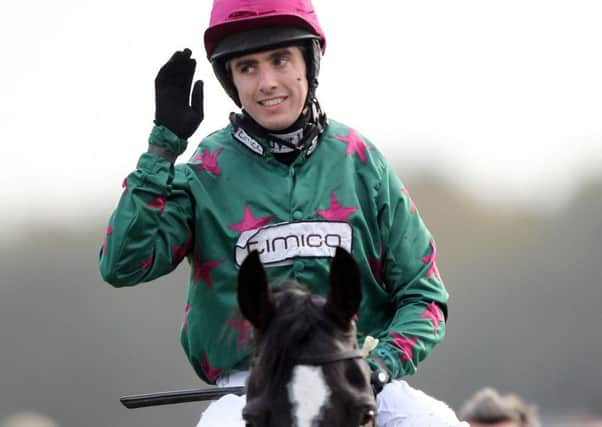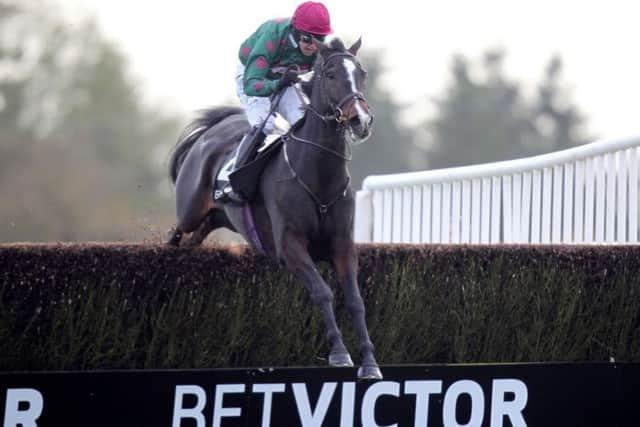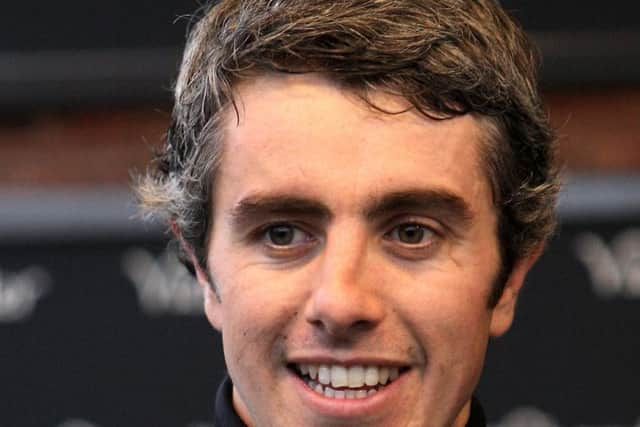Weekend Interview: Dominic Elsworth hopes horror fall will act as warning to young jockeys


Yet, more than three years after riding his last race and walking away from the sport that made him, the 38-year-old is only now coming to terms with his career’s premature end.
Now, in a candid interview, the Yorkshireman has revealed how he blames dehydration, excessive weight loss and his own single-mindedness for the hideous fall that nearly claimed his life.
Advertisement
Hide AdAdvertisement
Hide AdWhile Elsworth did make a miraculous comeback after 14 months out of the saddle, success became increasingly scarce.


However, by speaking out, he hopes today’s young riders will learn from his experience and seek the necessary advice about their health and diet so they can prolong their careers.
As a newly-qualified jockey coach helping to nurture the next generation, Elsworth felt the time is right to explain his decision to quit riding towards the end of 2014.
“I know I was riding as well as ever, but it’s very competitive and I was often travelling a long way for one ride which would hardly cover the expenses and travel costs,” said the Guiseley-born horseman, who started working for the Chanelle Group – headed by 20-times champion jockey Sir AP McCoy’s wife Chanelle and which supplies the veterinary industry with pharmaceutical products – after his horror fall five years earlier.
Advertisement
Hide AdAdvertisement
Hide Ad“I won the Haldon Gold Cup on Somersby, and finished second in the Champion Chase on the horse, but, with a young family, it forced me to think of the future and I’m very grateful for the faith shown in me by the Chanelle Group. It’s very, very different. Racing was a lot easier. It was a way of life. It’s very hard to adjust.”


Elsworth is not alone. Other rides have struggled to make the transition – or find compensation for the adrenaline rush that they experience when racing horses over obstacles at speeds of 30mph.
As a youngster, he used to show-jump ponies and go hunting before spending a decade at the High Eldwick yard of Sue and Harvey Smith and won the Cheltenham Festival’s Racing Post Plate a decade ago on Leeds owner Richard Longley’s rags-to-riches horse Mister McGoldrick.
After making the decision to move south in pursuit of further opportunities, Elsworth was taking his career to a new level when he drove to Ffos Las for the fateful ride on Keepitsecret in August, 2009.
Advertisement
Hide AdAdvertisement
Hide AdIt was high summer – fewer rides at this time of year make it harder for jockeys to keep their weight under control – and Elsworth, 5ft 10in tall, had gone to extreme lengths in order to make the 10-stone limit ahead of the three- mile chase.


“I’d spent a week doing hard wasting, drinking little, and I know I took a lot of fluid out of my body – too much in hindsight,” he told The Yorkshire Post. “When I had the fall, I went head first into the ground and it took over 20 minutes to resuscitate me. It had taken the fluid that protects the skull from the brain.
“On the Glasgow Coma Scale – five being alive and zero being dead – I was classed as one. Hot baths, sweating, saunas, Harvey (Smith) always said it would be bad for you.
“In the summer, your weight goes up. I don’t think I respected myself. I was so intent on riding winners that I just didn’t care. I didn’t listen. I hope others do. I was pushing the boundaries. I had the best neurological team and they said I was very, very lucky.”
Advertisement
Hide AdAdvertisement
Hide AdEven when Elsworth was released from hospital, the effects of the bruising on his brain left him with little co-ordination. He could not walk up or down steps. He had poor speech and did not have the balance needed to ride a bicycle, never mind a horse.


Then came the long haul back. Though Elsworth had, by then, lost his job as stable jockey to Oliver Sherwood, he defied the top Lambourn trainer – and others who under-estimated his resilience – by winning his comeback ride at Cheltenham in October, 2010 on the Paul Webber-trained Edgbriar.
Further success followed after he forged a successful alliance with three-time Cheltenham Gold Cup-winning trainer Henrietta Knight and her partner Terry Biddlecombe who knew, from painful experience, more than most about racing’s physical and mental hardships.
Somersby’s win in the Grade One Victor Chandler Chase at Ascot in January, 2012 provided Elsworth with his first – and only – win at the highest level. Other wins followed on the popular steeplechaser, including Exeter’s prestigious Haldon Gold Cup, and he also enjoyed riding horses of the calibre of Calgary Bay.
Advertisement
Hide AdAdvertisement
Hide AdYet, when Knight stopped training to look after the ailing Biddlecombe, who subsequently died in early 2014, the jockey lost his most important ally.
While he was incredibly grateful for the continued support of Somersby’s owners, Tim Radford and his late wife Camila, and the faith they showed, it was insufficient to sustain his career – or the time required to get to know their horses on the gallops four mornings a week.
Though Elsworth admits to having ridden with “broken bones” – and says every jump jockey is 100 per cent committed when the starting tapes go up – he says the weight did get the better of him.
However, while he says he would have struggled to compete with today’s talented young jockeys who are steeped in pony racing and point-to-point riding, advances in racing welfare would have made it easier for him to prolong his career.
Advertisement
Hide AdAdvertisement
Hide AdAs jockey coach, his proteges include former champion jockey Jonjo O’Neill’s son Jonjo junior, Flat apprentice and rising star Harry Burns and his god-daughter Louise Bannister, whose first point-to-point ride, on her 16th birthday, was a winning one.
However it is not just about riding – Elsworth is keen to stress the mental pressures that all jockeys face.
“You can give a horse a great ride and be placed. You can give one a bad ride and still win and the uninformed say it is great,” he adds before praising all the “fantastic people in a fantastic industry” who supported him throughout his riding career.
“Everyone can kick a football and knows how to play football. Not everyone can ride a racehorse and ride a race. Looking back, if I was to get going now, I don’t think anyone would use me – pony racing has really brought the game on.
Advertisement
Hide AdAdvertisement
Hide Ad“But the jockey coach initiative is a very good idea for the apprentices. The other week, I did a course walk at Warwick passing on my knowledge. Dietary advice and weight management has also moved on 10-fold in the last three or four years.
“There’s so much advice out there and so many people offering support – the sports scientists at John Moores University in Liverpool, the Professional Jockeys Association, the Injured Jockeys Fund and others.
“If my weight was good, I would do it tomorrow. I wanted to ride until I was 40.”
Bygones special: Mister McGoldrick’s Cheltenham triumph 10 years ago – Sports Monday